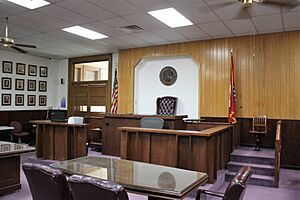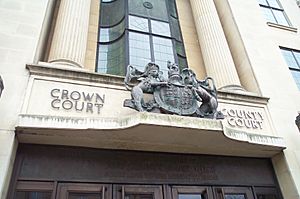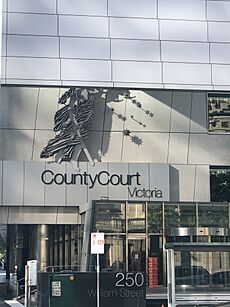County court facts for kids
A county court is a type of court that handles legal cases in a specific area, usually called a county. Think of a county as a local division within a country, like a district or region. These courts are important because they deal with many everyday legal issues for people.
Contents
County Courts in England and Wales
Since 2014, England and Wales have what is called "a single civil court" named the County Court. This doesn't mean there's only one building! Instead, it means there's one big, organized court system with many County Court buildings all over England and Wales. Before 2014, there were many separate county courts. Now, they all work together as one system.
You can start a case at a County Court in person, by mail, or sometimes online. Cases are usually heard where the person making the claim lives. Most cases are decided by a district judge or circuit judge working alone. Unlike some other courts, civil cases here usually don't have juries.
How Cases are Handled
Cases in the County Court are put into different "tracks" depending on how much money is involved:
- Small Claims Track: For cases involving less than £10,000. This is often called "small claims court" by people, but it's actually part of the County Court.
- Fast Track: For cases between £10,000 and £25,000 that can be finished in one day.
- Multi Track: For cases over £25,000. These cases might be heard in the County Court or a higher court called the High Court, depending on their value.
What Happens After a Judgment?
If someone wins a case about money owed, they get a County Court judgment. This is a legal order saying the money must be paid. If the money isn't paid, the court can help collect it. For example, court officers called bailiffs might take goods to sell, or money might be taken directly from the person's wages.
A County Court judgment is recorded in official registers and affects a person's credit score. This record shows how well someone manages their money. If the money is paid within 30 days, the record might not stay for long. But if it's not paid, the record can stay for six years, making it harder or more expensive to borrow money later.
County Courts in Australia
In Australia, the term County Court is used in the state of Victoria. In other Australian states, similar courts are called 'District Courts'. These courts handle serious criminal cases, but not the most serious ones like treason or murder. They also deal with civil cases (disputes between people or organizations) where the amount of money involved is usually between tens of thousands and hundreds of thousands of dollars.
These courts are in the middle of the Australian court system. Below them are the magistrates courts, which handle less serious matters. Above them are the state supreme courts, which deal with the most serious cases.
County Courts in Northern Ireland
In Northern Ireland, there are seven county courts. They work similarly to how courts in England and Wales operated before 2014. These are the main courts for civil cases. While very high-value cases go to the High Court, county courts in Northern Ireland handle many different civil actions, consumer claims, and appeals from less serious courts. When these courts deal with cases about children, they are called family care centres.
County Courts in the United States

In the United States, county court systems can be quite different from state to state. Some county courts mainly handle administrative tasks, like keeping records of properties. Others, more commonly, deal with civil cases (like lawsuits) and criminal cases. They often manage local jails, which are overseen by county sheriffs.
For example, in Texas, county courts handle certain types of less serious criminal cases (called Class A and B misdemeanors). They also share responsibility for some mid-sized civil cases and hear appeals from local municipal courts.
In some states, like Florida, county courts handle less serious criminal cases and civil cases involving amounts less than $15,000. More serious cases go to "circuit courts."
County Courts and City Courts
In large cities, the lines between county and city governments can sometimes seem blurry. However, even in big cities, county functions like coroners, sheriffs, jails, and courts are often separate from city police and city governments.
In states like New York, county courts outside of New York City handle trials for serious crimes (called felonies). They also hear appeals from less serious cases from local city, town, and village courts. They can also handle some civil cases involving money up to $25,000. In New York City itself, a different court called the New York City Criminal Court handles these types of cases.
It's important to remember that each U.S. state has set up its local governments and courts in ways that suit its own needs, so there isn't one single model for how county courts work across the entire country.
County Courts in Ireland
In Ireland (the Republic of Ireland), county courts existed before 1924. They were the main courts for most civil cases, similar to the county courts in England and Wales. However, their procedures were a bit different.
In 1924, the county courts in the Irish Free State were replaced by the Circuit Court. The Circuit Court still uses a similar structure to the old county courts. County courts still exist in Northern Ireland, which is part of the United Kingdom.
 | Sharif Bey |
 | Hale Woodruff |
 | Richmond Barthé |
 | Purvis Young |



